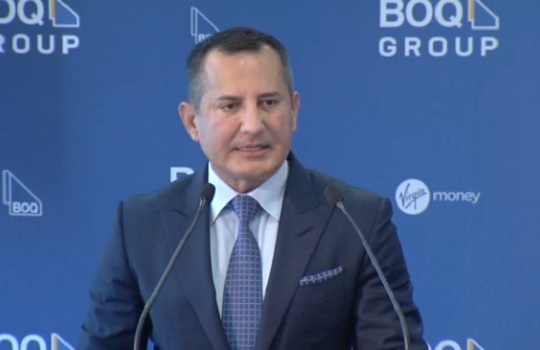
The Bank of Queensland (BOQ) will pursue a full build-out of its digital banking arm Virgin Money Australia (VMA) following a successful proof of concept by the banking group, chief executive George Frazis has revealed during BOQ’s full-year results presentation for FY19.
The new cloud-backed digital banking platform, built around the bank’s existing VMA service, will form a critical part of the company’s wider strategy to “close the digital and data gap”, Frazis said.
With year-on-year earnings down 14 per cent, FY19 has proved a disappointing year for BOQ. The expansion of VMA represents somewhat of a gamble for the Brisbane-based bank, with $30 million of investment capital to be pumped into ‘phase one’ of the project, of which $10 million will be funnelled “to additional resources and marketing to support the customer offering and growth”, Frazis said, with a full-scale launch of the digital bank expected in 2020.
Frazis, who served four years as chief executive for Westpac’s consumer bank before joining BOQ in June this year, is seeking to position VMA as the backbone of the bank’s digital offering, anticipating it will bring “compelling value to the group”.
“This is an investment in long-term value creation as we move towards a common cloud-based platform,” he said.
The expanded investment in and build-out of VMA, acquired by BOQ back in 2013, comes at a challenging time for the bank, which is unlikely to see a substantial change in revenue for FY20, it said.
VMA has nevertheless been a standout performer for the group, attracting a $914 million growth in housing loans, BOQ revealed in its full-year results report.
IT expenses have compounded the bank’s profit shortfall, totalling $125 million for FY2019 – a 5 per cent increase on FY18 figures. The $6 million jump was attributed to higher post-Hayne regulatory and compliance costs and increased operating expenses.
The bank said its $9 million bill for data processing and data collection expenses (offset by $3 million of “accelerated amortisation”) was a critical investment to support its wider digital transformation and compliance program, as well as overhauls of its digital and customer experience offerings announced last year.
Retiring chairman Roger Davis stressed the “considerable progress” made in modernising the bank’s technology infrastructure, including a shift from data centres to a cloud-based environment.
“This will deliver benefits in the future as we have better capacity to scale up, reduce cost, implement change and partner with external providers to deliver better solutions for our customers,” he said.
The bank is also “on track” to deliver a more contemporary mobile banking offering to our customers in 2020, David stressed.
“These are critical investments that will support our transformation and future aspirations.”
BOQ’s cash earnings after tax for FY19 was $320 million, a 14 per cent decrease from FY18. Statutory net profit after tax of $298 million, an 11 per cent drop from the previous year’s $336 million.
The bank attributed the reduction in earnings to “a combination of lower income, higher operating expenses and higher loan impairment expense”.





